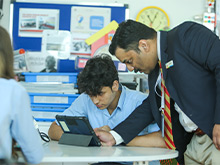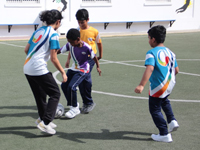Some common factors that lead to reading difficulties in students are ADHD and dyslexia. If your child is frustrated with reading and doesn’t enjoy books, it might be a good idea to build up your little one’s skills. Here’s how to make reading less work and more fun for your child:
1. Know that it’s normal
Before you worry yourself sick with anxiety, thinking that there’s something wrong with your child, know that there isn’t. Many parents assume that because their children learned to talk so easily, they would pick up reading just as easily. That’s often not the case. Many children struggle with reading. But a shaky start with books shouldn’t deter you. With continued practice and help, your child’s reading skills will improve over time.
2. Talk to the teacher
So much of what your child does in his or her international school in Dubai involves reading. From answering test papers to going over class lessons and more. What you can do to learn more about your child’s condition, though, is to talk to their teacher. Do they notice your child struggling with reading books and making out the words? Do they have any anecdotes or insights into how your child behaves in class? How does your child get through the lessons or tests that require reading?
3. Don’t blame yourself
Some parents take on the guilt and blame for their child’s reading struggles. “Why didn’t I notice how hard they have been trying?” That mindset isn’t going to help you. Just move past that. If you feel bad for your child, use that energy to help them overcome those reading struggles.
4. Look for a specialist
Don’t dismiss this problem, though. If your child is lagging in reading, it’s a communication delay problem. These issues are often an indication of a mental condition or learning disability. Make sure that’s not the case. Bring your child to a specialist. The opinion of an expert will help you figure out a possible reason for the reading difficulties.
5. Get reading support
If the results come back normal and your child is just having reading difficulties, it’s also a good idea to get reading support. Find a teacher or tutor who can help your child tackle those reading lessons. You can do it if you have enough patience and time. But if you don’t know the first thing about reading to children, much less teaching one how to read, then leave that task to the experts. They have the experience, the materials, and the techniques to make the learning experience much easier for your child.
Also Read: 10 Smart Learning Techniques
6. Ask about the lessons
Your interest is like magic to your child. When you ask about their reading lessons, it will help them review the lessons. It will also encourage your child to work even harder at learning the lessons, mostly out of love for you and a need to impress you or show you that they are doing so well. Children are attentive to these details because they generally want the same thing, your love. They think being better at reading will make them even more lovable to you. Your interest in what they do will encourage that.

7. Choose the right books
Provide your child with reading materials. But make sure you pick up enough titles that are at the child’s level. If they are making more than one mistake per ten words while reading, that book will be above their level. Getting books that suit your child’s reading skills should not mean that you should limit their reading options.
If you have a bookshelf at home, fill it up with books for older children or those with higher reading skills. That way, if your child is curious enough, they could work on reading through those titles. If your child has the determination and dedication to go over those titles, then best of luck to them, and hopefully, they will succeed in improving their vocabulary and reading skills at the same time.
8. Try Out Audiobooks
Different children have different learning styles. If your child isn’t responding to visual aids, try out audiobooks. If your child is an auditory learner, that could be why they have such a hard time making out the words with only visual cues to rely on. The audiobooks could go a long way towards helping your child improve their reading skills. Also, there are plenty of free audiobooks online. With so many interactive learning materials and options, your child has more than enough programs to try out.
9. Limit screen usage
If your child is addicted to video games, that could cut into their time for reading and homework. Limit screen time to ensure your child has more than enough time to do everything they need to. If your child throws a tantrum, you’ll need to learn how to teach your children to channel their frustration into something productive. Teach them that it’s okay to be upset. They should let themselves feel that emotion. But they don’t have to stay upset for the rest of the day.
Give in to the emotion for a moment and then move on. Teach them that. This will also come in handy when they find themselves frustrated with their reading difficulties. Knowing how to control themselves when they’re not feeling all right is a skill that will serve them well into adulthood.
10. Tell them it’s okay
Is your child having terrible reading difficulties that they are starting to get anxious about? Tell them it’s all right. Explain how stress and tension can make things harder. Teach them to relax and not tense up when reading. Just let the words flow. If you get it wrong the first time or even the next few times, that’s all right. You can always try again. Mistakes aren’t bad. They will help you improve. If your child has that mindset, they will learn not to associate reading with stress, enhancing those reading skills.
11. Express encouragement
Always offer your support and encouragement. Even if your child makes a mistake, show them that effort matters, too. Their hard work and study will pay off. When your child manages to show little progress, celebrate that win. Praise them for trying. With relentless encouragement, your child’s resolve will be tireless. It won’t be long before they are improving in leaps and bounds.
Many children struggle with reading difficulties. If your child has one, consult a specialist and ask the counsellor at the international school in Dubai to help you. Keep these tips in mind when you try to help them overcome those reading problems and struggles.
































